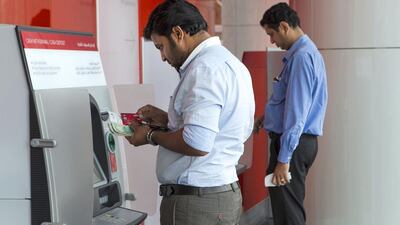Bank earnings in the UAE went from strength to strength in the first nine months of this year amid a boom in lending and an uptick in deposits.
The main driver behind this was government spending on roads, airports and other civic works that continued to fuel an economic revival after years of stagnation.
And amid low interest rates, the banks branched out in 2014 and found ways of making money other than the traditional business of loans.
Next year however may not be as buoyant. Crude oil, the main driver of the country’s economy, suffered a price collapse in the second half of 2014. That may reduce the amount of cash flowing into bank coffers and consequently the amount of money that banks are willing to lend, analysts say.
“The theme of this year has been accelerating loan growth, deposit growth was even faster,” said Jaap Meijer, the head of financial services research at Dubai-based investment bank Arqaam Capital. “There was attraction for foreign capital, and the amount banks set aside for bad debt has dramatically improved.
“But deposit growth will be slower in 2015 because governments won’t have substantial surpluses any more because of the drop in oil prices,” Mr Meijer added. “Deposit growth will probably slow down from around 11 per cent to 8 per cent, so that’s one major factor. That will reduce credit for the lending side. And it will depend on how deep the slump in oil is.”
UAE banks, whose profits rose to a record last year, have been the prime beneficiaries of a turnaround in the fortunes of the country’s economy, which grew by more than 4 per cent last year. Low interest rates, government spending and an influx of cash from other emerging markets that view the country as a safe haven has boosted deposits and encouraged lending.
For example, FGB, the country’s biggest bank by market capitalisation, reported a profit of Dh8.4 billion in the first nine months of 2014 compared to Dh6.6bn in the same period last year. Meanwhile National Bank of Abu Dhabi, the country’s second biggest bank by market value, had a net income of Dh8.4bn in the first nine months of this year versus Dh8.0bn in the same period in 2013.
In the past couple of years, corporations and individuals have taken advantage of low rates on bank loans for everything from refinancing old debt to buying new homes and cars. But because interest rates are low, the banks – of which there are more than 50 servicing a population of 9 million in the UAE – have had to compete for clients and search for other ways to make money apart from the interest they make on loans in fields that include trade finance, asset management and securities brokerage.
While these trends are likely to continue, they will probably be blunted this year by the drop in oil. The UAE is the world’s eighth-biggest oil producer and the Federal Government funds more than 60 per cent of its budget from crude exports. In December, tens of billions of dirhams were wiped off of stocks as panicky investors offloaded holdings but analysts think the equities sell-off is different from the last crash of 2008.
“Post the global financial crisis, central banks across the region have been focused on improving liquidity, capitalisation, and creating provisioning buffers,” bank analysts at Egyptian investment bank EFG-Hermes wrote in a report this month.
“With these in place, we believe banks should be able to withstand a potential shock to the macro [economic] environment,” the analysts said. “However, the most likely casualty of falling oil prices, particularly for GCC countries, is likely to be slower government spending and corporate confidence, and hence more limited loan growth opportunities.”
Still, most economists, including those at Standard Chartered and Capital Economics, do not expect major damage to regional economies from the recent fall in oil as regional governments have built up reserves, with the net current account surplus of the region standing at about $2.4 trillion.
Furthermore, many banks will be offered some protection from the oil price fallout by having expanded abroad in other emerging markets and diversifying their businesses away from relying too heavily on government related companies that are sensitive to oil price swings.
“It’s not going to have a catastrophic impact,” said Simon Penney, the head of wholesale banking at FGB. “It’s not like, oh gosh, we’re an oil exporting country, oil prices have dropped to US$65 a barrel, it’s Armageddon.”
Mr Penney said: “Where we see a lot of growth coming is of course in the traditional public sector.
“Hydrocarbons is by no means going away, but where we are seeing the majority of growth in the next 12 to 24 months is this structural shift [in GDP] towards the private sector.”
mkassem@thenational.ae

